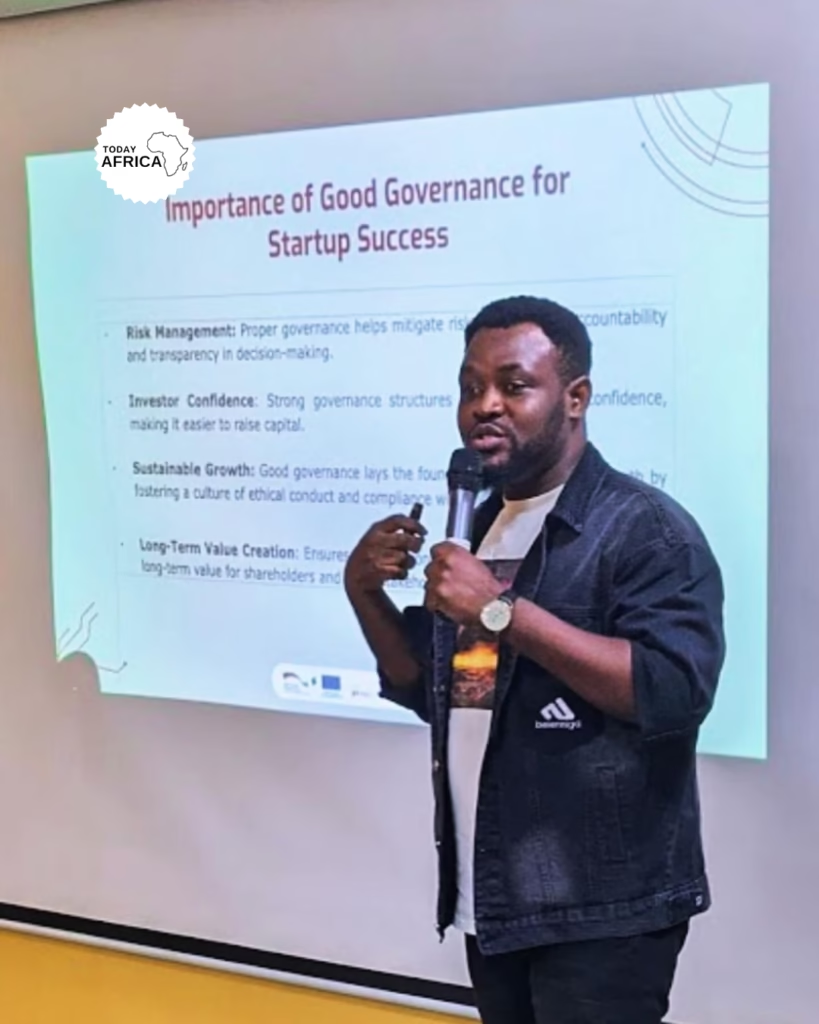Oladimeji Kuforiji is the founder of LawSavvy NG, a law firm providing strategic legal solutions to creatives, innovators and investors in the dynamic entertainment and startup ecosystem.
With expertise in a range of areas, including startup advisory, venture capital/private equity, company secretarial, commercial and corporate transaction advisory, data protection, media/entertainment and regulatory compliance, they are committed to helping founders, creatives and investors navigate legal challenges and achieve their business goals.
Oladimeji Kuforiji shared with Today Africa the mistakes that many founders make when starting out.
Tell us a bit about yourself
I’m a lawyer with a core focus on corporate and commercial practice. And I’ve been in active corporate and commercial practices since my call to the bar in 2016. Oh, funny enough, today is actually my bar anniversary.
So that is like nine years, according to the legal calendar, nine years post-call. Since then, I’ve been in active corporate and commercial practice with a core focus on firms, investors, and the creative ecosystem in general. That’s the summary of who I am.
Can you share a bit about your journey into law and what really inspired you to specialize in tech, startup, and investments?
My journey into law or I’ll say I grew up with an uncle who is a lawyer but he’s in active ligation. So in my early years I actually wanted to be going to court and that was what really triggered my interest in law. I think I have a way with technology and the entertainment space in general. I just found a way around it.
My mom worked as a secretary. I always have computers and all these gadgets around. So that was like my very first foundational interest in how the computer works. I figured out a lot of things on my own, graphic designing and all those things. That was literally the few tech things that I was doing.
After being called to the Nigerian bar and as I mentioned, my uncle is a lawyer. So I used to go to court and honestly didn’t really enjoy it. And I just wanted to do something entirely different. So my very first employment was as a business development executive. And I had to do a lot of things around managing websites, graphic design, and because of my graphic design skills.
That made me more interested in the tech ecosystem. So in 2018 I had a Google scholarship on front end web development. I learned all the HTML, CSS and everything. And I was actually planning on becoming a proper tech bro but to an extent it was very tedious. And I needed to merge my training as a lawyer and my interest in tech.

In fact, when I started I didn’t even really know that there is something called tech law. But as the ecosystem got bigger and young lawyers like myself started becoming knowledgeable about the space.
I just figured out that, yeah, this is what I want to do. I want to combine my interest in technology and my training as a lawyer to offer solutions to people like me, founders in the tech ecosystem and the startup ecosystem in general.
And because of a little bit of flair in the entertainment space as well and I was like this is it. Let’s offer solutions to founders that are creating solutions, investors that are investing in these founders that are creating this amazing solution, and the people in the creative space. That is why we created LawSavvy.
Read Also: Meet Lusanda Omelo Building Africa’s Largest AI Tools Directory
What were the challenges that you faced in the early stage of founding your business and how did you overcome them?
The challenges would be at first, the fact that you have to do a lot of things alone at the very beginning. And the mistake I made at the very early stage is not getting the right mentorship. Because as I said, I had to pick a lot of things on the way by myself.
So that’s a challenge that I faced and it made the journey slow. And that’s why I tell most founders, as you journey, make sure you work with someone that has done maybe close to what you’ve done. It makes the journey faster, you learn from their mistakes, and are able to move faster.
Another challenge that I faced would be basically just getting started. I’ll tell you for free, LawSavvy was not even supposed to be a law firm. The initial idea for LawSavvy is supposed to be a legal marketplace. It’s supposed to connect lawyers and people that need legal services.
Initially it’s supposed to be where a bunch of lawyers would just be on the platform and offer services to people. But the mistake that I made is I only knew front end web development and that is another lesson to every founder. You cannot do everything on your own. So you need to work with people that have the expertise that you lack.
Because I could not do the whole backend thing and everything. And honestly, I was not open to the whole knowledge that we can actually raise funds but I was not really knowledgeable in all those things at the very early stage.
So I’m like, oh, I’m a lawyer, let me just change this model to carving a niche as a lawyer and turning LawSavvy to a boutique law firm. Those are challenges that I’ve learned and I think everyone should do something that will build a better company for themselves.

In your experience as an investment and startup lawyer, what are the most common challenges that startup founders face and how can they proactively overcome them or address them?
Let’s start from me being an investment lawyer. I’ve worked with a venture capital firm, which actually opened my mind to the investor’s mind. So apart from working with startups, I also work with investors. And the important legal mistakes founders make at the very early beginning is their illegal documentation.
Most founders don’t understand the differences between the legal structures available. You find out that some founders are registering their business as a business name rather than a limited liability company. And the implication of that is no investors can come in with a structure that is a business name.
Because a business name is more like a sole proprietorship. But if you’re looking at getting investors, your business structure should be a limited liability company, which allows you to offer shares and all. So founders make that mistake.
Number two mistake is that most accelerator companies will advise that you work in pairs and you have a co-founder. And when these founders are starting this co-founding relationship, they miss the important part of not having a co-founders agreement. That could put founders in a lot of mess.
Because when you don’t spell out the roles and responsibility of each founder, you don’t spell out issues concerning investing schedules, how the equities will be distributed, how the equities that are distributed will be vested. Am I getting all my portion of shares immediately? Or is it going to vest over time?
We’ve had scenarios where one co-founder will decide to leave and the shares are still in the company because there is no founder’s agreement. Ideally, a founder’s agreement would have stated the terms that if you leave before your vesting schedule, is either you forfeit your shares or only a portion of the vested shares will be allocated to you.
And every smart lawyer would also put clauses that like, like a buy back clause. So even when you are leaving the company would have the right to buy the shares back. They missed all these things and it’s put founders in a lot of relationship trouble where the founder is no longer active in the company. One is actively putting work together and the one that left will just have the mindset that I have a share somewhere.
So those are a lot of troubles that we’ve witnessed in this space. Also, generally good documentation, your NDA, non-disclosure agreements, a simple service level agreement or employment agreement, clear terms, clear obligations regarding whatever relationship you’re entering into. Most founders make this mistake.
And importantly, the mistake of regulatory compliance. Every industry is unique and every industry or whatever business you’re doing might require some certain licenses or approval. And you’ll just see founders focusing on building the technology without getting all these approvals and everything.
At the end of the day, it might just be sanctioned with some heavy penalties and all this and it can even delay your investment process because investors during investment would ask for something called due diligence so they will check all your books and check everything. Do you have the required license and if you don’t have it, you have to go and get it.
And getting it may take maybe three to six months for you to get the license, which will invariably drag the investment discussion because you can’t proceed because you don’t have it.
So generally legal documentation, regulatory compliance, and the general corporate structure of the startup, these are things founders need to have at the very beginning and put in place before looking for funding.
When it comes to raising capital either through debt or equity, what key legal aspects should founders prioritize to ensure they address the scrutiny that will come from investors?
There is something called investment readiness, that’s getting your startup investments ready. So that whole process starts with the founders, putting things in place, it’s called a data room.

The data room can be an online file, in the cloud, or a physical file that contains all the necessary documentation in terms of incorporation documents, material agreements, permits and licenses, any strategic agreements for partnership, and your financial.
We have legal due diligence and financial due diligence. So investors want to see that we have a good legal standing and they also want to see that your financials are good in terms of your projection, in terms of the profits you make.
They want to see your book to know how much are you actually making and what is the projected amount that you can make in two, three, five years. So when preparing for fundraising and capital raise as the case may be, founders would put all this documentation in place.
That guides them on where they are and how much they really want to raise. And basically that is what the investors would check in terms of scrutiny. So there is a data room checklist that lawyers provide to start-ups when they are doing this process. They just check all the lists and everything. Do we have this? Do we have that? What are those that we don’t have that we can put in place?
So you populate the data and share with investors. So the investors look through, confirm you have a legal standing, confirm the ownership of the companies, the guys behind it, and your financial, doesn’t look good. And if it’s fine for them, they proceed with issues around it. What do you value yourself? What’s the company’s valuation? If you give you X amount. How much are we getting in return?
Read Also: Meet Ishaq Willson Building Africa’s First AI Property Search Platform
You seem to be helping founders register their holding companies in some jurisdiction. So what are the benefits and potential pitfalls of these decisions?
The ecosystem one way or the other just grew into choosing some preferred jurisdiction to house their investment. From a tax perspective, they are called tax-paving jurisdictions. So these jurisdictions are not heavy on taxes and everything.
An example of this is Delaware, which is the most popular one. We have BVI, British Virgin Islands, we have Cayman Islands, some startups use Seychelles, and Estonia. These are the ones coming to my head now.
But the most popular one is Delaware. And the reason for this is the majority of investors have grown to build more comfort with that jurisdiction. And in terms of their legislation, their courts, in terms of the tax. For example, founders are only expected to be something called a franchise tax, which is just annually.

Similar to the common returns that we file here in Nigeria. So that is the reason founders and investors generally have chosen these jurisdictions to be the investment company or the holding company.
Implication? I don’t really think there is an implication because the benefits outweigh the implication. You are able to house your investments in those jurisdictions. This happens especially when you are raising funds from global investors. So if you are in Nigeria and you only want to raise your fund from Nigeria, you don’t have to trouble yourself with registering your holding company with Delaware.
If you are looking at getting investment, most particularly in foreign currencies in dollars, or you are looking at getting investment from investors outside your jurisdiction. So these investors prefer to have their investment out in a company that is in a fair jurisdiction. We’ve seen cases where investors from China are investing in a Nigerian entity but they won’t invest it in the Nigerian entity. The investment will go to the holding company, which is most likely registered in Delaware.
It gives the investors’ more comfort. There is no issue of devaluation or anything. Also it gives the startups a good standing to get funding from investors from foreign jurisdictions.
Intellectual property is critical for many startups. What steps should founders take to ensure that their IP is protected especially in tech-driven and creative industries?
For startups in general intellectual property could be trademark, patent, copyright, trade secrets and trade design and all those things. The most popular ones are copyright; trademark, and patent.
As you mentioned, IP is very important. And from the early beginning, something as simple as your brand name, brand logo should be registered. The danger of not doing this is, the law recognizes the first come first serve basis. Except your brand has become very popular. And trust me, at the very early beginning, you’re not popular.
The law recognizes the first come to register. So perhaps you make the mistake of not registering and I think ideas are in the, they are in the air. Because you figure out that what you’re coming up with is actually not so secretive that nobody else would think of it.
Someone in another jurisdiction can actually be thinking of the same thing. It’s like this Marvel fiction, multiverse. There is like another you in another country thinking the way you’re thinking, that is thinking of the same idea. It makes more sense when you’re fast enough to register yours first. So you are protected. Even if the person launches, yours is first to be registered. So nothing would happen.
Intellectual property is also so important that you want to register things like a trademark, you want to register a patent. So a patent deals with whatever novel invention that you’ve created for the startup.
And most importantly, founders should protect themselves from the public, they should actually protect themselves from their own people, their employees. So every startup signs something called a confidentiality and intellectual property assignment agreement. So what this does is at the very early stage, let’s say your technical person, the person building the app, building the product can actually be an external person or it can be outsourced.
When you then make the mistake of not signing a CIP, the tech guy can just wake up one morning and like, oh, I don’t like you, you’re treating me, blah, blah, blah. I’m going in. And like that, he’s gone with the product. Maybe a UI/UX person is gone with the entire design. And you have to start from scratch.

We’ve actually seen very weird situations like that. A very simple way to solve that type of problem is to sign an intellectual property assignment agreement that says, whatever you’re building at this stage, whatever you’re designing, whatever work you are doing in the course of your engagement with the company, you have assigned it back to the company. So it is not yours. That way you are protecting yourself from internal trouble. So these are things that need to be put in place in terms of intellectual property.
You help people to draft and review their contracts, both founders and investors. What are those elements that founders seem to overlook that could pose a risk to their startup in the future?
This is a very good question. And they actually need to hear this because most of these guys are interested in one clause. That’s the consideration or the payment clause. How much is the man paying me? How much is the investor paying me? They are fine with that. They miss out very important clauses.
Let’s even start from obligations like what would I be doing? After collecting this money, what am I supposed to do? There are clauses around, oh, you’re actually supposed to give some periodic reporting. There are things that are caused by condition precedent and condition subsequent.
Condition precedence means you have to do it before. And condition subsequent means you have to do it after. And there are some conditions subsequent that can be tied to the validity of the contract. There are some conditions subsequent that can say if you don’t do this within so-so- time, it will be seen as a breach of the contract and the contract becomes void.
There are some conditions subsequent that would say if you don’t maybe get this license or make this certain appointment or do so-so-so based on the timeline that you’ve been given. Maybe they are revoking the license or there will be some penalties. Those things are very important.
Also, dispute resolution, if anything happens, how would disputes resolve? So a good dispute resolution clause should look at negotiation and settle it amicably. A good dispute resolution should look at, if we are unable to settle it amicably, are we looking at mediation or are we looking at arbitration? Where would be the seat of the arbitration? So are we doing it in Lagos? Are we doing it in Abuja?
Is that convenient for both parties if any issue comes up? Would the arbitration be the final thing or we still have to go to court? So those things need to be cleared out. It becomes messy when an issue now happens that everybody is now going back and forth. That no, you have to come to Port Harcourt to resolve this matter. You have to fly over to the U.S. to resolve the matter.
But when we have it in an agreement that this is the jurisdiction that we’ve chosen for dispute. This is how it’s going to be handled. We are only appointing one arbitrator. Each party is going to be responsible for the fees of their arbitrator. Those things need to be cleared.
Imagine maybe the aggrieved party now says we are appointing an arbitrator and our arbitrator is collecting so and so millions. Then the other party will be like you are the one that wants to go to court. You are the one that is dragging this thing. I don’t have any money to pay anybody. So those things can be very messy if they are issues. So it needs to be clear.
Read Also: How I Built a Successful PR and Digital Marketing Agency – Nomsa Mdhluli
Other terms can be around termination of the contract. How do we exit? What happens is I decide to leave. So these are common in contracts like SLA, (Service Level Agreements), or independent contractors agreement, or a master service agreement, stuff like that. So how do we end this relationship?
Because every agreement is creating a relationship. So how do I exit, what is going to happen? Am I giving you a 30 days notice? So after the 30 days notice, do I need to submit something back to the company? What happens if you are owing me after exiting? How do I get my money back? If I’m exiting before the completion of the service and I’ve actually paid you in full, how are we going to calculate how much you are to refund back? So those things are very important.

How do we terminate? And what happens after termination? How do we exit this relationship without any issues? They are very important. Think of it also as defining the relationship of the party. Are we agents? Are we partners? Or are we independent?
We’ve seen situations where people will be like we have an agreement with these people and they will start speaking with the client or customers or the people that they have an agreement with. So the relationship needs to be clear. See, you are just an independent contractor. You are only employed for this certain service and upon completion of the service, you are done. You are not expected to do something in my name or behind me.
If there is anything that needs to be done, you need to get my consent first. Clauses around non-solicitation, non-compete, it needs to be clear. Because we are in agreement and most likely this agreement will open you to some level of trade secrets in my business, you are not expected to now go and open another business exactly like my own that will be in competition with me.
So things around non-solicitation, non-compete. The non-solicitation means going behind me to maybe solicit for my employees or solicit my client to move them to your own side. Pricing, payments, are you making payments? Are you making it in full? Will it be in tranches? Will it be in milestones? Those things need to be cleared. So it’s not just, this is how much I’m receiving, this is how much I’m collecting. There are a lot of other things that need to be scrutinized during your contract stage.
What best practices do you recommend for maintaining strong corporate governance as businesses or as a business expands?
In Nigeria and in some other jurisdictions, we have a corporate governance principle. And what this principle or whatever code of conduct surrounding it promotes is transparency, accountability, fairness, and the likes. There are some investors that at the very early beginning, they want to see your corporate structure.
For a growing startup, establishing good corporate governance is very important. And how you do this is in terms of the decision making. You want to set up a proper board structure. So you want to have directors in the company. And this board can be a three, five, seven-man board for your decision making.
Also, you need to have an independent person on the board. Someone that is not into the day-to-day running of the company, someone that can give an independent unbiased opinion about the decision you’re making in the board.
There is also something called an advisory board. These are things investors want to see, you actually have and you have experts on board that can advance the journey of the company in making the right decision, either financial decisions, legal decisions, business decisions, decisions pertaining to risk. So you want to have experts on all those concerns on your board.
Also, in terms of corporate governance, the relationship of the shareholders, it needs to be defined. What are their roles? What are the roles of members, the founders, the CTO, the CEO, it’s important everyone understand their roles and responsibility and be accountable for those roles.
So things like that are very, very important. During the due diligence stage, we’ve seen investors ask for your corporate governance structure in place, do you have a board? And this is because in the ecosystem digital investors or some venture capital firm would actually ask for a board representation. So I don’t just want to give you my money. I want to be on your board to actually oversee your decision making.
In recent times, we have investors getting observer seats on board or getting a representative that will be appointed as a director in the company that would actually attend company meetings. Imagine you’ve actually not even set up anything, so those structures need to be put in place.
And for more established startups that are regulated by the CBN or SEC, so maybe for the Fintech guys now that are getting some payment license from CBN or getting investment licensing from Securities and Exchange Commission. Having a good corporate governance structure is not even negotiable because you will be filing reports on your corporate governance structure.
Read Also: Meet Emmanuel Jacobs Building Africa’s Largest Indigenous B2B Fashion Ecommerce
What key lessons have you learned over the years in your journey as a startup and investment lawyer?
The mind to learn because the startup ecosystem is growing every year. I don’t know the curriculum now but they didn’t teach us in school. They will teach you the basics, contracts, intellectual property, how the ecosystem actually works, things around funding, things around accelerators, things around advising startups is not in the university curriculum.

For young lawyers, you need to be open to learning, and the beautiful thing now is that they are more content now than before. And I think there are a little bit more startup lawyers than before that you can learn from. Be very open to learning and know how to figure things out, make research, ask your mentors questions.
What legal strategy to advise would you give to aspiring entrepreneurs who are launching their startups?
From a legal standpoint, don’t ignore the legal issues from the very beginning. I think about it now. For the simple co-founders’ relationship, even at the idea stage, get a lawyer involved, and have some sort of partnership agreement or a founders’ agreement, even from the idea state, or from the point of picking a name for that brand.
Document everything and pay attention to your legal documentation. Pay attention to your structuring, how you’re structuring the company, how you’re protecting your intellectual property. Regardless of whoever comes up with the name, regardless of whoever comes up with the idea of the business, all of it must be assigned back to the company.
It shouldn’t be owned by any individuals, not even the founders. Everything should be assigned back to the entity. In terms of building the product, take your time to actually understand your market, understand the product you’re building, ensure you build a solution that actually identifies the market. Understand the pain points of your existing customers. Then build the product that solves the problem that they have.
Click here to read the rest of the interview with Oladimeji Kuforiji.
To find out more, contact Oladimeji Kuforiji via:
Leave a comment below and follow us on social media for update:
- Facebook: Today Africa
- Instagram: Today Africa
- Twitter: Today Africa
- LinkedIn: Today Africa
- YouTube: Today Africa Studio
















